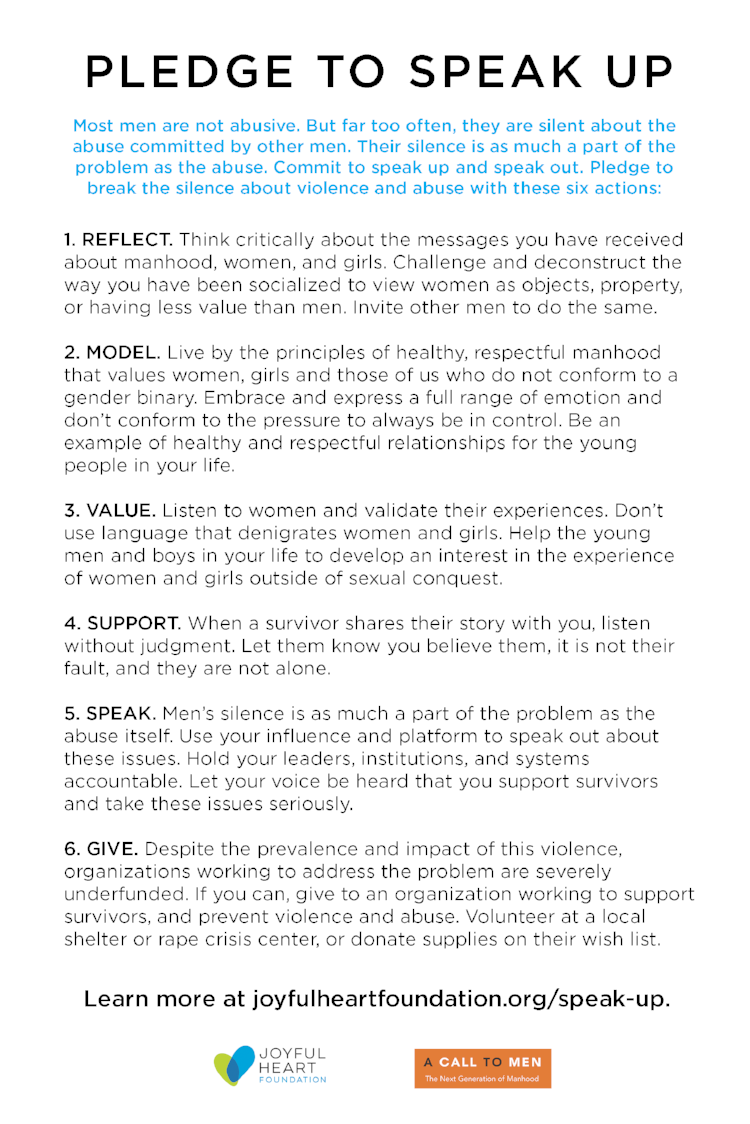#IWILLSPEAKUP
Every day, a new story about sexual assault, abuse, and harassment emerges.
We are witnessing survivors coming forward to share their personal stories in a way we have not seen before. Celebrities, our friends, our sisters, our daughters, and ourselves—are speaking out about these experiences. From the simple yet powerful #MeToo to women’s detailed personal accounts in news stories and op-eds, this violence is at the forefront of our attention. The volume of the conversation is way up, getting louder, and showing no sign of stopping. It is inescapable.
For too long we have relied on those who have experienced violence to be the brave ones to speak out, stand up, and confront the problem or perpetrator. Yet we also know that for every survivor who comes forward, there is another who won’t—or feels that they can’t. We have a long way to go before survivors feel they will be believed and supported. Moments like these can be deeply challenging, retraumatizing, and triggering for survivors. They are affected by other people’s stories and the words and attitudes expressed in response to the headlines. We must support survivors’ healing in this conversation.
We can’t let survivors bear the burden alone any more. It’s time for all of us—especially men—to pick up the torch, and to sustain the fire of bringing about far-reaching cultural change.
We can transform society’s response to this violence if women and men work together. Together we can challenge—and ultimately change—the entrenched attitudes and beliefs that have allowed and supported sexual violence for so long.
Most men are not abusive. But far too often, they are silent about the abuse committed by other men. Their silence is as much a part of the problem as the abuse.
Why don’t men speak out?
Institutions, corporations, and organizations typically approach sexual harassment, domestic violence, and sexual assault solely from a policy perspective. But this approach keeps the problem contained within one area, like the human resources department. It also allows men who are not actively harassing, abusing, or assaulting to say, “This is not my problem.” Those men can separate themselves from the “incident” when in reality, they are the solution.
These issues are not limited to the workplace and sexual harassment. They are pervasive throughout our society and serve as the foundation for all forms of violence against women and girls, including domestic violence and sexual assault. Men are socialized to believe that women have less value than men, are the property of men and are objects for men—specifically sexual objects. That collective male socialization creates a climate where men often give other men the benefit of the doubt, don’t believe women, or blame women for the violence that other men perpetrate against them.
That’s why sexist jokes at the water cooler, sexual harassment, and all forms of violence and discrimination against women and girls persist, and will continue until men decide that it shouldn’t. Only men can end men’s violence against women.
There are things all men can do to change this.
Men can use their influence and platform to speak out about these issues. Some men don’t even realize they have a platform, but they all do. All men have friends, colleagues, family members, and young men and boys in their lives that they can talk to about healthy, respectful manhood. Speak up.
Today, we launched a new PSA campaign that magnifies the effect of men’s silence. This silence allows violence against women and girls to go unchecked and perpetuates it in our families, in our workplaces, on college campuses, our military, and everywhere else. Our campaign, “#IWILLSPEAKUP,” is a series of spots featuring notable actors and artists.

This campaign, gives us hope that men—in speech and in action—will speak up about the violence and abuse perpetrated by other men.
Join us. Together, we can embrace and promote a healthy, respectful manhood. Together, we can stand up and speak out against the violence and abuse that happens every single day in our country. Together, we can, we will, we must change this culture of silence and of violence.
Say #IWILLSPEAKUP. Today, we ask for your pledge—your promise—to use your influence and platform to speak out about these issues, to support survivors, to believe what they say, and to hold other men accountable for the abuse they perpetrate.
Take the pledge to speak up.
Co-written by Ted Bunch, co-founder of A CALL TO MEN and Maile M. Zambuto, national chief executive officer, Joyful Heart Foundation